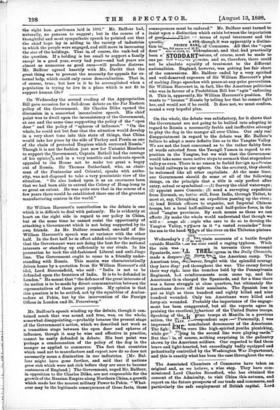Sir William Harcourt's contribution to the debate is one which
it is difficult to deal with patiently. He is evidently at heart on the right side in regard to our policy in China, but at the same time he cannot resist the opportunity of attacking a Government which is not being supported by its own friends. As Mr. Balfour remarked, one-half of Sir William Harcourt's speech was at variance with the other half. In the first half he in effect added colour to the charges that the Government were not doing the best for the national interests or standing up sufficiently to our rivals. In his peroration he took the old-fashioned Liberal and anti-Jingo line. The Government ought to come to a friendly under- standing with Russia. This maxim was characteristically driven home by a quotation from Sir William Harcourt's old idol, Lord Beaconsfield, who said : " India is not to be defended upon the frontiers of India. It is to be defended in London." He meant that " the defence of the great interests of the nation is to be made by direct communication between the representatives of these great peoples. My opinion is that this question is to be settled, not by the squabbles of Ambas- sadors at Pekin, but by the intervention of the Foreign Offices in London and St. Petersburg."


































 Previous page
Previous page